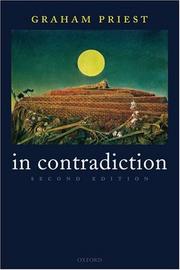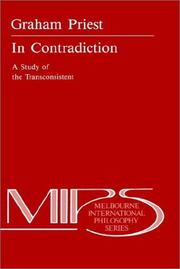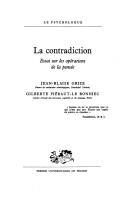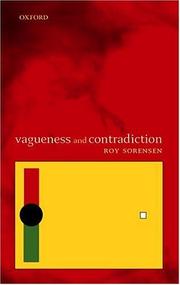| Listing 1 - 10 of 35 | << page >> |
Sort by
|

ISBN: 1280905336 9786610905331 0191532487 1435622251 9781435622258 0199263299 0199263302 9780199263295 9780199263301 9780191718823 0191718823 9781280905339 6610905339 9780191532481 Year: 2006 Publisher: Oxford Oxford New York Clarendon Press Oxford University Press
Abstract | Keywords | Export | Availability | Bookmark
 Loading...
Loading...Choose an application
- Reference Manager
- EndNote
- RefWorks (Direct export to RefWorks)
In Contradiction advocates and defends the view that there are true contradictions (dialetheism), a view that flies in the face of orthodoxy in Western philosophy since Aristotle. The book has been at the centre of the controversies surrounding dialetheism ever since its first publication in 1987. This second edition of the book substantially expands upon the original in various ways, and also contains the author's reflections on developments overthe last two decades. Further aspects of dialetheism are discussed in the companion volume, Doubt Truth to be a Liar, also published by Oxford Univer
Contradiction. --- Philosophy --- Dialetheism --- Paradox

ISBN: 9024736307 9789024736300 Year: 1987 Volume: 39 Publisher: Dordrecht: Nijhoff,
Abstract | Keywords | Export | Availability | Bookmark
 Loading...
Loading...Choose an application
- Reference Manager
- EndNote
- RefWorks (Direct export to RefWorks)
Contradiction --- Philosophy --- Dialetheism --- Paradox --- Contradiction.

ISBN: 2130375529 9782130375524 Year: 1983 Volume: 85 Publisher: Paris: PUF,
Abstract | Keywords | Export | Availability | Bookmark
 Loading...
Loading...Choose an application
- Reference Manager
- EndNote
- RefWorks (Direct export to RefWorks)
Contradiction --- Philosophy --- Dialetheism --- Paradox --- Contradiction. --- Contradiction (psychologie)
Book
ISBN: 9781108993135 9781108834414 9781108995009 1108995004 1108834418 1108993133 1108999026 1108999247 Year: 2021 Publisher: Cambridge : Cambridge University Press,
Abstract | Keywords | Export | Availability | Bookmark
 Loading...
Loading...Choose an application
- Reference Manager
- EndNote
- RefWorks (Direct export to RefWorks)
Logical paradoxes - like the Liar, Russell's, and the Sorites - are notorious. But in Paradoxes and Inconsistent Mathematics, it is argued that they are only the noisiest of many. Contradictions arise in the everyday, from the smallest points to the widest boundaries. In this book, Zach Weber uses "dialetheic paraconsistency" - a formal framework where some contradictions can be true without absurdity - as the basis for developing this idea rigorously, from mathematical foundations up. In doing so, Weber directly addresses a longstanding open question: how much standard mathematics can paraconsistency capture? The guiding focus is on a more basic question, of why there are paradoxes. Details underscore a simple philosophical claim: that paradoxes are found in the ordinary, and that is what makes them so extraordinary.
Logic, Symbolic and mathematical --- Paradox --- Dialetheism --- Inconsistency (Logic) --- Dialetheism. --- Logic, Symbolic and mathematical. --- Paradox.

ISBN: 0199263299 9780199263295 0199263302 9780199263301 0191718823 Year: 2006 Publisher: Oxford: Clarendon,
Abstract | Keywords | Export | Availability | Bookmark
 Loading...
Loading...Choose an application
- Reference Manager
- EndNote
- RefWorks (Direct export to RefWorks)
In Contradiction advocates and defends the view that there are true contradictions (dialetheism), a view that flies in the face of orthodoxy in Western philosophy since Aristotle. The book has been at the center of the controversies surrounding dialetheism ever since its first publication in 1987. This second edition of the book substantially expands upon the original in various ways, and also contains the author's reflections on developments over the last two decades. Further aspects of dialetheism are discussed in the companion volume, Doubt Truth to be a Liar, also published by Oxford University Press in 2006.
Contradiction. --- Contradiction --- Philosophy --- Dialetheism --- Paradox --- Truth. --- Inconsistency (Logic) --- Philosophy.
Book
ISBN: 3658259906 3658259892 Year: 2019 Publisher: Wiesbaden : Springer Fachmedien Wiesbaden : Imprint: Springer VS,
Abstract | Keywords | Export | Availability | Bookmark
 Loading...
Loading...Choose an application
- Reference Manager
- EndNote
- RefWorks (Direct export to RefWorks)
This volume focusses on contradiction as a key concept in the Humanities and Social Sciences. By bringing together theoretical and empirical contributions from a broad disciplinary spectrum, the volume advances research in contradiction and on contradictory phenomena, laying the foundations for a new interdisciplinary field of research: Contradiction Studies. Dealing with linguistic phenomena, urban geographies, business economy, literary writing practices, theory of the social sciences, and language education, the contributions show that contradiction, rather than being a logical exemption in the Aristotelian sense, provides a valuable approach to many fields of socially, culturally, and historically relevant fields of research. Contents Contradiction in Narrative and Discursive Orders.- Contradiction in Interpersonal Communication and Institutions.- Contradiction, Power, and Governmentality.- Contradiction in Territorial Orders and Infrastructures Target Groups Researchers and students in the Humanities and Social Sciences The Editors Julia Lossau is professor of Human Geography at the University of Bremen, Germany. Daniel Schmidt-Brücken is a postdoctoral researcher in German Linguistics at the University of Bremen, Germany. Ingo H. Warnke is professor of German and Interdisciplinary Linguistics at the University of Bremen, Germany. .
Contradiction. --- Philosophy --- Dialetheism --- Paradox --- Social sciences—Philosophy. --- Social Philosophy.

ISBN: 1501731149 9781501731143 9780801444449 0801444446 Year: 2018 Publisher: Ithaca, NY : Cornell University Press,
Abstract | Keywords | Export | Availability | Bookmark
 Loading...
Loading...Choose an application
- Reference Manager
- EndNote
- RefWorks (Direct export to RefWorks)
"Everything is contradictory," Hegel declares in Science of Logic. In this analysis of one of the most difficult and neglected topics in Hegelian studies, Songsuk Susan Hahn tackles the status of contradiction in Hegel's thought. Properly philosophical thinking in the Hegelian mode recognizes that contradiction pervades all organic forms of life. Contradiction in Motion presents Hegel's doctrine of contradiction, once widely dismissed, as one deserving serious consideration. The book argues that contradiction is not a sign of error or incoherence, but rather plays an important role in the development of Hegel's system.The first part of the book sets up Hegel's logic of organic wholes in such a way as to motivate his claim that everything is contradictory. Hahn explores how Hegel tests his abstract logical and methodological apparatus against the more concrete, unmanageable aspects of empirical nature. The second and third parts of the book examine the extent to which Hegel's organic model informs his aesthetics and ethics. Hahn reveals the privileged role of art forms in expressing our consciousness of organic unity and shows how Hegel's organic-holistic conception of cognition and nature, with its distinctively contradictory stance, can be incorporated coherently into his ethics.
Contradiction. --- Philosophy --- Dialetheism --- Paradox --- Hegel, Georg Wilhelm Friedrich,
Book
ISBN: 9791037014610 Year: 2022 Publisher: Paris : Hermann éditeurs,
Abstract | Keywords | Export | Availability | Bookmark
 Loading...
Loading...Choose an application
- Reference Manager
- EndNote
- RefWorks (Direct export to RefWorks)
Depuis Aristote et les débuts de la logique, la non-contradiction est un des trois axiomes de la logique dite classique, peut-être même le plus important, à côté de celui d'identité et de tiers-exclu. Les travaux que mène Graham Priest depuis le début des années 1970 ont pourtant démontré les limites de cette approche et mis en valeur le fait que certaines contradictions sont réelles. Patiemment il a ainsi élaboré une logique du paradoxe à laquelle le présent livre entend introduire, en réunissant (et en traduisant pour la première fois au lectorat francophone) quelques articles phares de l'auteur qui compte sûrement parmi les plus grands penseurs des cinquante dernières années.
Contradiction --- Paradoxe --- Fallacies (Logic) --- Whole and parts (Philosophy) --- Dialetheism

ISBN: 0199241309 9780199241309 Year: 2001 Publisher: Oxford: Clarendon,
Abstract | Keywords | Export | Availability | Bookmark
 Loading...
Loading...Choose an application
- Reference Manager
- EndNote
- RefWorks (Direct export to RefWorks)
Contradiction. --- Vagueness (Philosophy). --- Vague (Philosophie) --- Dialetheism --- Contradiction --- Vagueness (Philosophy) --- Philosophy --- Paradox
Book
ISBN: 9782406065586 9782406065593 2406065588 2406065596 Year: 2019 Publisher: Paris Classiques Garnier
Abstract | Keywords | Export | Availability | Bookmark
 Loading...
Loading...Choose an application
- Reference Manager
- EndNote
- RefWorks (Direct export to RefWorks)
"Si, comme l'affirmait Aristote, la contradiction est difficilement recevable en logique classique, car "si une chose est, il n'est pas possible qu'elle ne soit pas tout à la fois", l'analyse de corpus oraux en revanche démontre que les structures langagières imposant une contradiction sont familières dans le discours spontané. Loin de ne servir que des fins stylistiques ou rhétoriques, la contradiction s'actualise bel et bien en discours et l'aporie logique qu'elle manifeste à première vue met au contraire en scène une énonciation singulière qui (ré-)organise le discours de manière dynamique. Cet ouvrage met au jour les différentes formes que peut prendre la contradiction discursive et en propose une typologie des effets pragmatiques."--Page 4 of cover.
Logic --- Pragmatics --- French language --- Contradiction --- Discourse analysis --- Gesprochene Sprache --- Philosophy --- Dialetheism --- Paradox --- Énonciation (linguistique)
| Listing 1 - 10 of 35 | << page >> |
Sort by
|

 Search
Search Feedback
Feedback About UniCat
About UniCat  Help
Help News
News